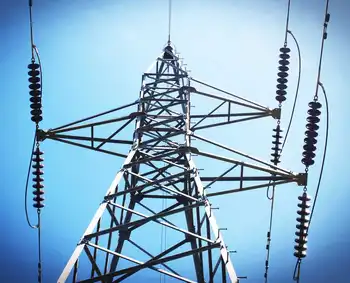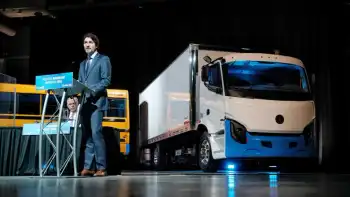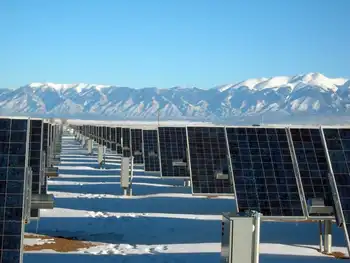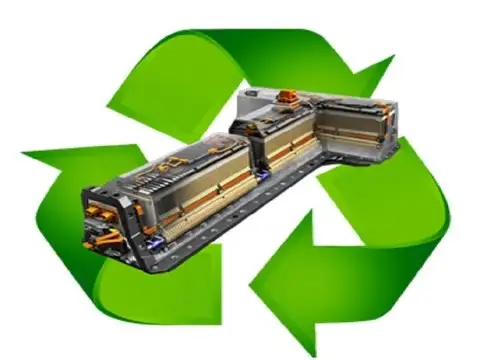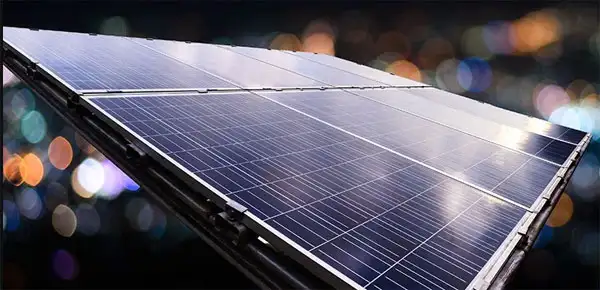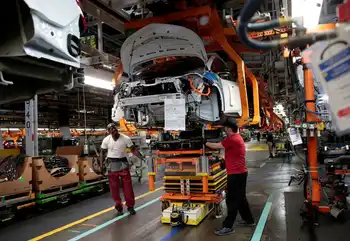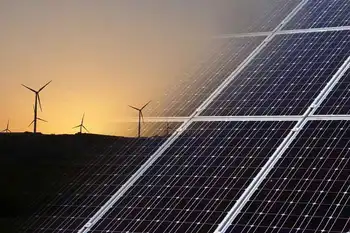EV Battery Recycling and Urban Mining enable a circular economy by recovering lithium-ion materials like nickel, cobalt, and lithium, building a closed-loop supply chain that lowers emissions, reduces costs, and strengthens sustainable EV manufacturing.
Key Points
Closed-loop recovery of lithium-ion metals to cut emissions, costs, and supply risk across the EV battery supply chain.
✅ Cuts lifecycle emissions via circular, closed-loop battery materials
✅ Secures nickel, cobalt, lithium for resilient EV supply chains
✅ Lowers costs and dependency on mining; boosts sustainability
Few people have had the sort of front-row seat to the rise of electric vehicles as JB Straubel.
The softly spoken engineer is often considered the brains behind Tesla: it was Straubel who convinced Elon Musk, over lunch in 2003, that electric vehicles had a future. He then served as chief technology officer for 15 years, designing Tesla’s first batteries, managing construction of its network of charging stations and leading development of the Gigafactory in Nevada. When he departed in 2019, Musk’s biographer Ashlee Vance said Tesla had not only lost a founder, but “a piece of its soul”.
Straubel could have gone on to do anything in Silicon Valley. Instead, he stayed at his ranch in Carson City, Nevada, a town once described by former resident Mark Twain as “a desert, walled in by barren, snow-clad mountains” without a tree in sight.
At first glance it is not the most obvious location for Redwood Materials, a start-up Straubel founded in 2017 with a formidable mission bordering on alchemy: to break down discarded batteries and reconstitute them into a fresh supply of metals needed for new electric vehicles.
His goal is to solve the most glaring problem for electric vehicles. While they are “zero emission” when being driven, the mining, manufacturing and disposal process for batteries could become an environmental disaster for the industry as the technology goes mainstream.
JB Straubel is betting part of his Tesla fortune that Redwood can play an instrumental role in the circular economy
“It’s not sustainable at all today, nor is there really an imminent plan — any disruption happening — to make it sustainable,” Straubel says. “That always grated on me a little bit at Tesla and it became more apparent as we ramped everything up.”
Redwood’s warehouse is the ultimate example of how one person’s trash is another person’s treasure. Each weekday, two to three heavy-duty lorries drop off about 60 tonnes worth of old smartphones, power tools and scooter batteries. Straubel’s team of 130 employees then separates out the metals — including nickel, cobalt and lithium — pulverises them and treats them with chemicals so they can re-enter the supply chain as the building blocks for new lithium-ion batteries.
The metals used in batteries typically originate in the Democratic Republic of Congo, Australia and Chile, and emerging sources such as Alberta’s lithium potential are being explored, dug out of open-pit mines or evaporated from desert ponds. But Straubel believes there is another “massive, untapped” source: the garages of the average American. He estimates there are about 1bn used batteries in US homes, sitting in old laptops and mobile phones — all containing valuable metals.
In the Redwood’s warehouse, Straubel’s team separates out the metals, including nickel, so they can re-enter the supply chain
The process of breaking down these batteries and repurposing them is known as “urban mining”. To do this at scale is a gargantuan task: the amount of battery material in a high-end electric vehicle is roughly 10,000 times that of a smartphone, according to Gene Berdichevsky, chief executive of battery materials start-up Sila Nano. But, he adds, the amount of cobalt used in a car battery is about 30 times less than in a phone battery, per kilowatt hour. “So for every 300 smartphones you collect, you have enough cobalt for an EV battery.”
Redwood is also building a network of industrial partners, including Amazon, electric bus maker Proterra and e-bike maker Specialized, to receive their scrap, even as GM and Ford battery strategies highlight divergent approaches across the industry. It already receives e-waste from, and sends back repurposed materials to, Panasonic, which produces battery cells just 50 miles north at the Tesla Gigafactory.
Straubel is betting part of his Tesla fortune that Redwood can play an instrumental role in the emergence of “the circular economy” — a grand hope born in the 1960s that society can re-engineer the way goods are designed, manufactured and recycled. The concept is being embraced by some of the world’s largest companies including Apple, whose chief executive Tim Cook set an objective “not to have to remove anything from the earth to make the new iPhones” as part of its pledge to be carbon-neutral by 2030.
If the circular economy takes root, today’s status quo will look preposterous to future generations. The biggest source of cobalt at the moment is the DRC, where it is often extracted in both large industrial mines and also dug by hand using basic tools. Then it might be shipped to Finland, home to Europe’s largest cobalt refinery, before heading to China where the majority of the world’s cathode and battery production takes place. From there it can be shipped to the US or Europe, where battery cells are turned into packs, then shipped again to automotive production lines.
All told, the cobalt can travel more than 20,000 miles from the mine to the automaker before a buyer places a “zero emission” sticker on the bumper.
Despite this, independent studies routinely say electric vehicles cause less environmental damage than their combustion engine counterparts. But the scope for improvement is vast: Straubel says electric car emissions can be more than halved if their batteries are continually recycled.
In July, Redwood accelerated its mission, raising more than $700m from investors so it could hire more than 500 people and expand operations. At a valuation of $3.7bn, the company is now the most valuable battery recycling group in North America. This year it expects to process 20,000 tonnes of scrap and it has already recovered enough material to build 45,000 electric vehicle battery packs.
Advocates say a circular economy could create a more sustainable planet and reduce mountains of waste. In 2019 the World Economic Forum estimated that “a circular battery value chain” could account for 30 per cent of the emissions cuts needed to meet the targets set in the Paris accord and “create 10m safe and sustainable jobs around the world” by 2030.
Kristina Church, head of sustainable solutions at Lombard Odier Investment Managers, says transportation is “central” to creating a circular economy, not only because it accounts for a sixth of global CO2 emissions but because it intersects with mining and the energy grid.
“For the world to hit net zero — by 2050 you can’t do it with just resource efficiency, switching to EVs and clean energy, there’s still a gap,” Kunal Sinha, head of copper and electronics recycling at miner Glencore says. “That gap can be closed by driving the circular economy, changing how we consume things, how we reuse things, and how we recycle.
“Recycling plays a role,” he adds. “Not only do you provide extra supply to close the demand gap, but you also close the emissions gap.”
Although niche today, urban mining is set to become mainstream this decade given the broad political support for electric vehicles, an EV inflection point and policies to address climate change. Jennifer Granholm, US secretary of energy, has called for “a national commitment” to building a domestic supply chain for lithium-based batteries.
It is part of the Biden administration’s goal to reach 100 per cent clean electricity by 2035 and net zero emissions by 2050. Granholm has also said the global market for clean energy technologies will be worth $23tn by the end of this decade and warned that the US risks “bring[ing] a knife to a gunfight” as rival countries, particularly China, step up their investments, while Canada’s EV opportunity is to capitalize on the U.S. auto sector’s abrupt pivot.
In Europe, regulators emphasise environmental and societal concerns — such as the looming threat of job losses in Germany if carmakers stop producing combustion engines. Meanwhile, Beijing is subsidising the sector to boost sales of electric vehicles by 24 per cent every year for the rest of the decade, according to McKinsey.
This support, however, could have unintended consequences.
A shortage of semiconductors this year demonstrated the vulnerability of the “just-in-time” automotive supply chain, with global losses estimated at more than $110bn. The chip shortage is a harbinger of a much larger disruption that could be caused by bottlenecks for nickel, cobalt and lithium supply risks as every carmaker looks to electrify their vehicle portfolio.
Electric car sales last year accounted for just 4 per cent of the global total. That is projected to expand to 34 per cent in 2030, underscoring the accelerating EV timeline, and then swell to 70 per cent a decade later, according to BloombergNEF.
“There is going to be a mass scramble for these materials,” says Paul Anderson, a professor at the University of Birmingham. “Everyone is panicking about how to get their technology on to the market and there is not enough thought [given] to recycling.”
Monica Varman, a clean tech investor at G2 Venture Partners, estimates that demand for battery metals will exceed supply in two to three years, leading to a “crunch” lasting half a decade as the market reacts by redesigning batteries with sustainable materials. Recycled materials could help ease supply concerns, but analysts believe it will only be enough to cover 20 per cent of demand at most over the next decade.
So far, only a handful of start-ups besides Redwood have emerged to tackle the challenge of reconstituting discarded materials. One is Li-Cycle, based in Toronto and founded in 2016, reflecting Canada-U.S. collaboration in EV supply chains, which earlier this year raised more than $600m in a merger with a special purpose acquisition company valuing it at $1.7bn. Li-Cycle has already lined up partnerships with 14 automotive and battery companies, including Ultium, a joint venture between General Motors and LG Chem.
Tim Johnston, Li-Cycle chair, says the group’s plan is to create facilities it calls “spokes” around North America, where it will collect used batteries and transform them into “black mass” — the powder form of lithium, nickel, cobalt and graphite. Then it will build larger hubs where it can reprocess more than 95 per cent of the substance into battery-grade material.
Without urban mining at scale, Johnston worries that the coming shortages will be like the 1973 Arab oil embargo, when US petrol prices quadrupled within four months, imposing what the US state department described as “structural challenges to the stability of whole national economies”.
“Oil you can actually turn back on relatively quickly — it doesn’t take that long to develop a well and to start pumping oil,” says Johnston. “But if you look at the timeline that it takes to develop a lithium asset, or a cobalt asset, or a nickel asset, it’s a minimum of five years.
“So not only do you have the potential to have the same sort of implications of the oil embargo,” he adds, “but [the effects] could be prolonged.”
Beyond aiding supply constraints and helping the environment, urban mining could also prove cheaper. A 2018 study on the recycling of gold and copper from discarded TV sets in China found the process was 13 times more economical than virgin mining.
Straubel points out that the concentration of valuable material is considerably higher in existing batteries versus mined materials.
“With rock and ores or brines, you have very low concentrations of these critical materials,” he says. “We’re starting with something that already is quite high concentration and also has all the interesting materials together in the right place. So it’s really a huge leg up over the problem mining has.”
The top-graded lithium found in mines today are just 2 to 2.5 per cent lithium oxide, whereas in urban mining the concentration is four to five times that, adds Li-Cycle’s Johnston.
Still, the process of extracting valuable materials from discarded products is complicated by designs that fail to consider their end of life. “Today, the design parameters are for quick assembly, for cost, for quality, fit and finish,” says Ed Boyd, head of the experience design group at Dell, the computer company. Some products take 20 or 30 minutes to disassemble — so laborious that it becomes impractical.
His team is now investigating ways to “drastically” cut back the number of materials used and make it so products can be taken apart in under a minute. “That’s actually not that hard to do,” he says. “We just haven’t had disassembly as a design parameter before.”
‘Monumental task’
While few dismiss the circular economy out of hand, there are plenty of sceptics who doubt these processes can be scaled up quickly enough to meet near-exponential demand for clean energy technologies in the next decade. “Recycling sounds very sexy,” says Julian Treger, chief executive of mining company Anglo Pacific. “But, ultimately, [it] is like smelting and refining. It’s a value added processing piece which doesn’t generally have enormous margins.”
Brian Menell, the founder of TechMet, a company that invests in mining, processing and recycling of technology metals and is partly owned by the US government, calls it “a monumental task”. “In 10 years’ time a fully optimised developed lithium-ion recycling battery industry will maybe provide 25 per cent of the battery metal requirements for the electric vehicle industry,” he says. “So it will be a contributor, but it’s not a solution.”
The real volume could be created when the industry recycles more electric vehicle batteries. But they last an average of 15 years, so the first wave of batteries will not reach their end of life and become available for recycling for some time. This extended timeline could be enough for technologies to develop, but it also creates risks. G2 Ventures’ Varman says recycling processes being developed now, for today’s batteries, risk being made redundant if chemistries evolve quickly.
Even getting consistent access to discarded car batteries could be a challenge, as older cars are often exported for reuse in developing countries, according to Hans Eric Melin, the founder of consultancy Circular Energy Storage.
Melin found that nearly a fifth of the roughly 400,000 Nissan Leaf electric cars produced by the end of 2018 are now registered in Ukraine, Russia, Jordan, New Zealand and Sri Lanka — places where getting a hold of the batteries at end-of-life is harder.
Berdichevsky of Sila Nano says his aim is to make EV batteries that last 30 years. If that can be accomplished, pent-up demand for recycling will be less onerous and costs will fall, helping to make electric vehicles more affordable. “In the future we’ll replace the car, but not the battery; of that I’m very confident,” he says. “We haven’t even scratched the surface of the battery age, in terms of what we can do with longevity and recycling.”
Related News
